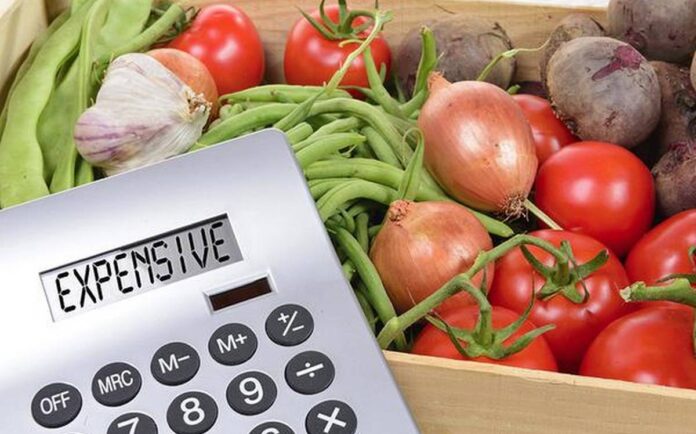Federal Minister for Finance and Revenue Shaukat Tarin presided over the National Price Monitoring Committee (NPMC) meeting, held at the Finance Division on Tuesday, 8th February. Updates regarding the weekly SPI were discussed.
The Consumer Price Index (CPI) is a measure of average change in prices of certain goods and services over a period of time and it is calculated each month by the Pakistan Bureau of Statistics. The sensitive price index (SPI), on the other hand, is a measure of average change in prices from one week to another. So, the SPI is calculated on a weekly basis and is used by the government to keep track of weekly inflationary trends as opposed to the CPI, which is used as an indicator for inflation over longer periods of time, like over months or years. According to the State Bank of Pakistan, the SPI monitors prices of 53 essential commodities in 73 markets across 17 major cities of Pakistan to assess the price situation in the country.
During the meeting, the Finance Division Economic Advisor briefed the NPMC about the weekly Sensitive Price Index (SPI). The SPI witnessed an increase of 1.35 per cent as compared to the previous week, when it had seen a decline of 0.11 per cent.
Out of this, 1.30 per cent increase was as a result of increase in prices of 33 food items, whereas 0.05 per cent increase was owing to 18 non-food items. Meanwhile, 23 items remained stable in the last week. Whereas, prices of six items decreased and contributed to a 0.17 per cent decline in SPI.
Around 1.52 per cent increase in the SPI was owing to increase in prices of 22 items which included tomatoes priced at a 0.97 per cent higher rate than last week, chicken at a 0.40 per cent higher rate, garlic at a 0.02 per cent higher rate, and other items priced at a 0.13 per cent higher rate. The items that saw a decrease in prices included potatoes, whose prices came down by 0.05 per cent, onions, by 0.03 per cent, eggs, by 0.04 per cent, and others, by 0.05 per cent. Potatoes, onions, eggs, sugar, moog pulse, and mash pulse experienced decline in prices during the last week.
On the prices of wheat flour in particular, NPMC was informed that wheat flour prices in Quetta remained on the higher side as compared to other parts of the country. The chair expressed concerns on higher prices of wheat flour in Quetta and directed for concrete measures to be taken for ensuring stable wheat flour prices. This is to be done by increasing the stock position of flour and its daily releases to the flour mills. Furthermore, it was reported that sufficient wheat stocks were available in the country.
NPMC also discussed sugar prices in the country and was apprised that a slight decrease in the sugar prices have been witnessed in the last week. The chair directed the Ministry of Industries and Production to expedite the process for building strategic reserves of sugar in the country to maintain stability in prices.
NPMC was also updated on the prices of pulses in the country. NPMC was informed that there was stability in the prices of moong while other pulses have shown slight increase in prices. Expressing concerns on the prices of pulses, the finance minister directed provincial authorities to control the hike in prices of pulses by keeping a check on hoarding and supply disruptions.
Prices of edible oil were also discussed in the meeting. The Ministry of Industries and Production Secretary updated the committee on the strategy to ensure fair prices of edible oil in the market in coordination with provincial authorities against the edible oil manufacturers for undue price escalation. The chair further directed the Ministry of Industries and Production to work out a demand and supply pattern of different varieties and brands of edible oil and to take corrective measures to control undue price hike.
Regarding the wholesale and retail prices of daily commodities in the country, it was informed that there has been a decrease in the wholesale and retail prices of various items in the last week. Slight increase has been witnessed in the wholesale and retail prices of potatoes and onions which was attributed to increase in transportation charges. The chair further directed provincial authorities to take measures to reduce the wholesale and retail price gap.
Comparison of daily commodities’ prices in Pakistan with regional countries, India, Bangladesh and Sri Lanka showed that prices were lowest in Pakistan. It was communicated that Pakistan stood the best in the region in keeping a control on the prices of daily use commodities.
In his concluding remarks, the finance minister underscored the efforts being made for keeping prices of essential items in check and the measures being taken to ensure smooth supply of essential commodities throughout the country.





Do Something Good Tarin…!!!
space frame
stem wall
acrylic-roof-coating/
Stem Wall
load bearing wall
glass block wall
Retaining wall types
parapet wall
breast wall
weep holes in retaining wall
Advantages of Diagrid Structures
pier and beam foundation pros and cons
How to detect expansive soils
Gypcrete pros and cons